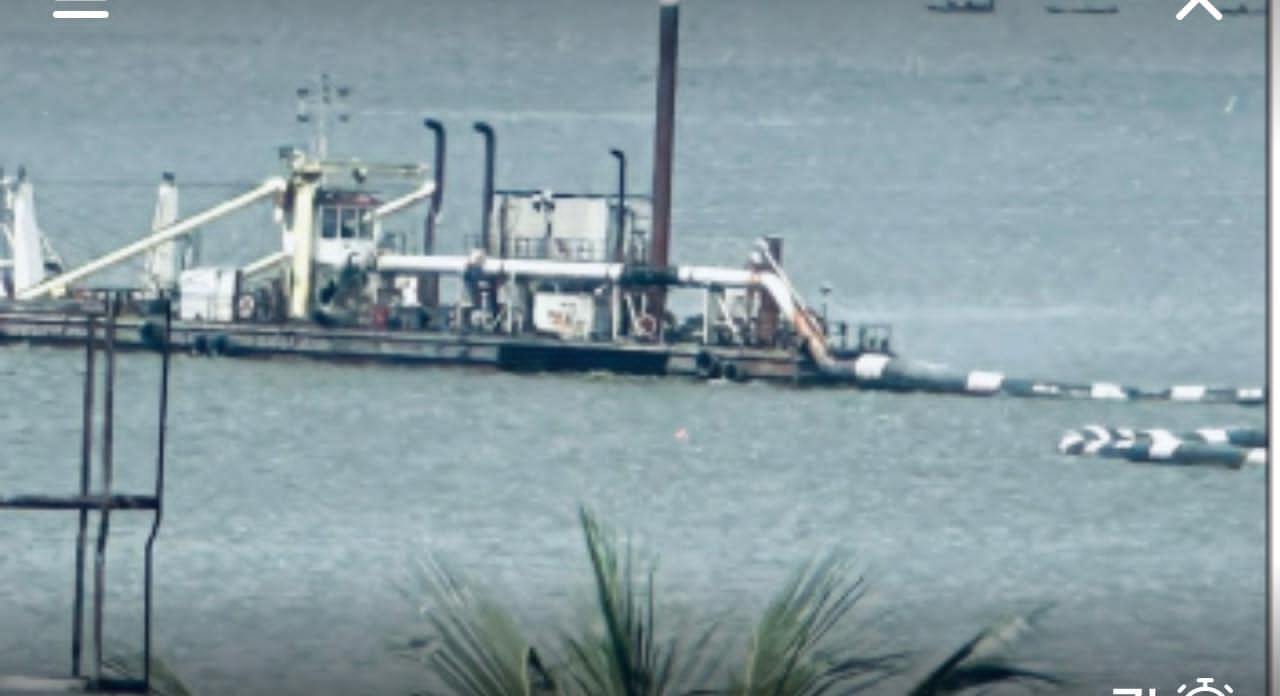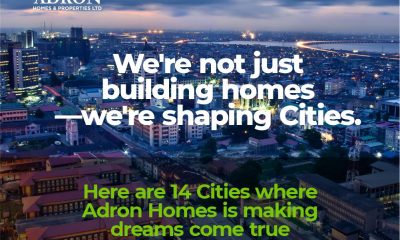Business
Terror By The Sea…Lagos Waterfront Turns Concrete Jungle As Land Speculators, Realtors, Sand-Fill Ikoyi Bay For Housing Projects

Terror By The Sea…Lagos Waterfront Turns Concrete Jungle As Land Speculators, Realtors, Sand-Fill Ikoyi Bay For Housing Projects
l How Illicit Sand-Filling Of Lagoon Fuels Climate Crisis
l Residents At Risk Of Been Submerged
Disaster looms on the coastal belt of Lagos as real estate developers swoop on the sprawling estates and luxurious neighbourhoods dotting the panoramic expanse of Ikoyi. Consequently, residents panic against the backdrop of the distortion of the city’s master plan by land speculators working in cahoots with estate developers. The latter flagrantly spurn the policies and programmes of the state government which are geared to address climate change, thus aggravating the flooding and possible submerging of the state’s upscale neighbourhood, writes Bennet Oghifo
One businessman messes with Mother Nature, and an entire city suffers the brunt of his misjudgment. Yet most businessmen hustle to shield themselves from the effects of their error in judgment. While this may seem probable in ideation, it is impracticable.
Thus at the real estate mogul’s unsettling of mother nature, chaos ensues, and the truth dawns on society like blisters of eternal damnation; everyone gets to understand that there are neither rewards nor punishments for provoking mother nature, just consequences.
Consider the terrifying case of Ikoyi, in Lagos Island, for instance, since land speculators and developers swooped on its waterfronts, sand-filling the Lagos lagoon and encroachment on the beautiful waterfronts that adorn the upscale neighbourhood, the area has been exposed to protracted flooding and erasure of its once sightly esplanades.
Recently, the residents of the highbrow Ikoyi Crescent, in Lagos, were jolted to see their waterfront awash with sand courtesy of the operations of an upstream dredger, whose equipment bore the insignia of “Dredging Atlantic.” They watched in abject horror as the sand-filling operations of the land speculator brought down the upscale quality of the neighbourhood; they rued the probability of seeing the lagoon succumb to the unregulated and unauthorised real estate venture.
Mortified by the ensuing consequences in terms of a possible loss of the aesthetics the lagoon offers their properties and an outlet for floodwaters, the residents petitioned the Lagos State government.
In 2017, a group, the Coalition of Concerned Citizens of Lekki, Ikoyi and Victoria Island, expressed similar trepidation, with its representative Olusegun Ladega, an architect, exposing the distortion of the Lekki drainage regional master plan “caused by the indiscriminate sand-filling of natural waterways.” According to him, the sand-filling of Lagos lagoons and oceans is causing coastal erosion, forcing water back to land. The Ikoyi Crescent residents observed that the realtors and developers sand-filling the lagoon close to their neighbourhood had no proof of an environmental impact assessment report. Ladega believed the Lagos government could do more, stressing that the inability of the environment, waterfront and physical planning ministries to “work together” has resulted in infringement and breach of environmental laws by the ministries’ poor enforcement of environmental laws, building regulations and town planning guidelines.
Lagos ministries at the heart of the matter
The Ministry of Waterfront Infrastructure Development directly oversees the waterfront. The Ikoyi Crescent residents said they made their observations known to the ministry. Neither the waterfront ministry, the Ministry of the Environment, the Ministry of Physical Planning and Urban Development could tell what is going on in the Ikoyi neighbourhood. The environment ministry told THISDAY it did not approve the sand-filling of the lagoon, citing that it is not under its purview. The physical planning ministry did not respond to THISDAY’s inquiry.
However, the waterfront ministry replied to the newspaper’s inquiry, albeit unofficially.“They did not obtain approval from the ministry. The ministry did not give them any approval. When the ministry received complaints about their activity, a ‘stop work order’ was issued to them,” said an official of the waterfront ministry who spoke under anonymity.
The official did not state if the Lagos government would penalise or prosecute the trespassers.In October, the Commissioner for Waterfront Infrastructure Development, Yacoob Ekundayo Alebiosu, issued a ‘stop-work order’ on illegally built structures at Oyinkan Abayomi, Ikoyi, in the Eti-Osa Local Government Area, pending a review of any prior regulatory licences that may have been granted.Alebiosu had issued the order while inspecting several development sites along the waterfront corridor across Lagos, noting that the development violated the state’s regulations.
“The state government’s attention has been directed to the large unlawful development projects that have destroyed the area’s desirable waterfront scenery, putting the entire environment at risk of erosion and degradation,” said the commissioner. In November, the Lagos government announced that following the non-compliance with the ‘stop-work order’ issued earlier to a developer of an ongoing multi-floor residential building on Oyinkan Abayomi Drive, Ikoyi, it had sealed the site of the project ordering workers to vacate the building immediately.
While the commissioner admitted that dredging could be done in Lagos, Alebiosu emphasised that it must be done with control and caution not to disturb the ecosystem and endanger the lives and property of the people. Lagos is the smallest state in Nigeria, yet it has the highest urban population, 27.4 per cent of the national estimate (UN-Habitat). Lagos’ dominant vegetation is the swamp forest of the fresh water and mangrove swamp forests, both of which are influenced by its double rainfall pattern, making the environment a wetland region. The Lagos drainage system is characterised by a maze of lagoons and waterways, constituting about 22 per cent or 787 sq. km. (75.755 hectares) of the state’s territory. In 2020, the Lagos government, in collaboration with the United Nations Development Programme (UNDP) and C40 Cities, took bold steps to address the climate change scourge, which has become a defining environmental challenge to the state and several other parts of the world. But, the clandestine activities of realtors and developers seem to undo all the government’s positive steps.
What lies beneath
By 2030, an estimated 108 to 116 million people in Africa will live in low-elevation coastal zones—defined as areas 10 meters or less above sea level, a figure projected to double by 2060, according to the Africa Centre for Strategic Studies, noting that in the near term, North and West Africa will be most directly affected, comprising 85 per cent of the projected 100 million population affected on the continent, though every region is threatened. Egypt and Nigeria, with high-density metropolises near the coast, are anticipated to face the greatest population disruptions.
Home to at least 20 million people and expected to be the world’s largest city “by the end of the century, Lagos, a low-lying city on Nigeria’s Atlantic coast, also experiences the triple impact of perennial fluvial (river), pluvial (rainfall), and coastal flooding.”The centre explained that adding up the damages to assets, economic production, and mortality, the World Bank found the total cost of “just fluvial and pluvial flooding in Lagos is $4 billion annually,” pointing out that rising sea levels combined with high urbanisation will exacerbate future damage. It added that between 2020 and 2030, Africa’s seven largest coastal cities—Lagos, Luanda, Dar es Salaam, Alexandria, Abidjan, Cape Town, and Casablanca—are projected to grow by 40 per cent (48 million people to 69 million) compared with the continent’s overall anticipated increase of 27 per cent (1.34 billion to 1.69 billion).“Smaller coastal cities may expand even faster: Port Harcourt in Nigeria, for example, is expected to grow 53 per cent over this decade. Globally, Africa’s coastal regions are anticipated to experience the highest rates of population growth and urbanisation in the world,” said the centre.
Public-private collusion?
THISDAY contacted Dredging Atlantic, whose equipment was sighted working at the lagoon. There was a denial of involvement in the ruination of the lagoon beyond a commercial hire of their equipment by an unnamed realtor or developer.“That is false information (that Dredging Atlantic was the firm sand-filling the lagoon). I just made an enquiry, and it’s not Dredging Atlantic. They hired our equipment,” a representative of the company said. “But if you want to get clearer information, then go to the Lagos State Ministry of Waterfront Infrastructure Development. We don’t have any permit to work there. It’s not in our name.”
When the Dredging Atlantic official was told that the dredger on site belonged to Dredging Atlantic, his response was: “They hired our dredger.” However, “the company also undertakes various marine construction projects and geotechnical works; excavation offshore reclamation contracts; services for developing water installations for marine facilities and excavation contracts; drilling and deepening waterways, ports and marine installation,” according to information on its website.
A marine expert, Hakeem Ogunbambi, told THISDAY that it is unlikely private investors, realtors, and developers are carrying out the surreptitious sand-filling of the Ikoyi Crescent lagoon without the active collusion of Lagos government officials.“This reclamation is not being done by the private sector alone. They have their collaborators in the government. So, nobody can just take their dredger to the lagoon and begin to dredge or begin to do reclamation without the backing of some government officials.” Ogunbambi suggested that “those close” to Sanwo-Olu are not unlikely to be at the top of the food chain.
Nonetheless, the Lagos government is committed to the ideals of climate change. Last August, in a bid to combat and mitigate the effects of climate change in Lagos, Governor Babajide Olusola Sanwo-Olu restated his administration’s commitment to working closely with experts, organisations, and the global community to ensure that Lagos remains at the forefront of climate action in Nigeria, admitting that “while we have made significant progress, there is still much work to be done since the challenges faced demand continuous innovation, collaboration and adaptation.”
The clandestine sand-filling of the Ikoyi Crescent lagoon will require “much work” from the Lagos government to stop unauthorised developers and realtors from wreaking havoc on the Ikoyi axis and its waterfronts. Lagos Lagoon is receding, no thanks to so-called speculators and developers illegally assuaging the appetite for upscale real estate with little or no regard for watercourse, town planning codes and safety, according to several Ikoyi residents.
Apprehensive residents worry that the indiscriminate sand-filling of the lagoon will aggravate the already perennial flooding in Ikoyi. According to THISDAY checks, several dredging activities along the lagoon shoreline are usually carried out at night, surreptitiously encroaching the waterfronts of some Ikoyi residents.
Realtors and developers are forming landmass by illegally sand-filling the Lagos lagoon and selling the land to unsuspecting affluent and sometimes influential figures.
Business
Nigeria’s Inflation Drops to 15.10% as NBS Reports Deflationary Trend

Nigeria’s headline inflation rate declined to 15.10 per cent in January 2026, marking a significant drop from 27.61 per cent recorded in January 2025, according to the latest Consumer Price Index (CPI) report released by the National Bureau of Statistics.
The report also showed that month-on-month inflation recorded a deflationary trend of –2.88 per cent, representing a 3.42 percentage-point decrease compared to December 2025. Analysts say the development signals easing price pressures across key sectors of the economy.
Food inflation stood at 8.89 per cent year-on-year, down from 29.63 per cent in January 2025. On a month-on-month basis, food prices declined by 6.02 per cent, reflecting lower costs in several staple commodities.
The data suggests a sustained downward trajectory in inflation over the past 12 months, pointing to improving macroeconomic stability.
The administration of President Bola Ahmed Tinubu has consistently attributed recent economic adjustments to ongoing fiscal and monetary reforms aimed at stabilising prices, boosting agricultural output, and strengthening domestic supply chains.
Economic analysts note that while the latest figures indicate progress, sustaining the downward trend will depend on continued policy discipline, exchange rate stability, and improvements in food production and distribution.
The January report provides one of the clearest indications yet that inflationary pressures, which surged in early 2025, may be moderating.
Bank
Alpha Morgan to Host 19th Economic Review Webinar

Alpha Morgan to Host 19th Economic Review Webinar
In an economy shaped by constant shifts, the edge often belongs to those with the right information.
On Wednesday, February 25, 2026, Alpha Morgan Bank will host the 19th edition of its Economic Review Webinar, a high-level thought leadership session designed to equip businesses, investors, and individuals with timely financial and economic insight.
The session, which will hold live on Zoom at 10:00am WAT and will feature economist Bismarck Rewane, who will examine the key signals influencing Nigeria’s economic direction in 2026, including policy trends, market movements, and global developments shaping the local landscape.
With a consistent track record of delivering clarity in uncertain times, the Alpha Morgan Economic Review continues to provide practical context for decision-making in a dynamic environment.
Registration for the 19th Alpha Morgan Economic Review is free and can be completed via https://bit.ly/registeramerseries19
It is a bi-monthly platform that is open to the public and is held virtually.
Visit www.alphamorganbank to know more.
Business
GTBank Launches Quick Airtime Loan at 2.95%

GTBank Launches Quick Airtime Loan at 2.95%
Guaranty Trust Bank Ltd (GTBank), the flagship banking franchise of GTCO Plc, Africa’s leading financial services group, today announced the launch of Quick Airtime Loan, an innovative digital solution that gives customers instant access to airtime when they run out of call credit and have limited funds in their bank accounts, ensuring customers can stay connected when it matters most.
In today’s always-on world, running out of airtime is more than a minor inconvenience. It can mean missed opportunities, disrupted plans, and lost connections, often at the very moment when funds are tight, and options are limited. Quick Airtime Loan was created to solve this problem, offering customers instant access to airtime on credit, directly from their bank. With Quick Airtime Loan, eligible GTBank customers can access from ₦100 and up to ₦10,000 by dialing *737*90#. Available across all major mobile networks in Nigeria, the service will soon expand to include data loans, further strengthening its proposition as a reliable on-demand platform.
For years, the airtime credit market has been dominated by Telcos, where charges for this service are at 15%. GTBank is now changing the narrative by offering a customer-centric, bank-led digital alternative priced at 2.95%. Built on transparency, convenience and affordability, Quick Airtime Loan has the potential to broaden access to airtime, deliver meaningful cost savings for millions of Nigerians, and redefine how financial services show up in everyday life, not just in banking moments.
Commenting on the product launch, Miriam Olusanya, Managing Director of Guaranty Trust Bank Ltd, said: “Quick Airtime Loan reflects GTBank’s continued focus on delivering digital solutions that are relevant, accessible, and built around real customer needs. The solution underscores the power of a connected financial ecosystem, combining GTBank’s digital reach and lending expertise with the capabilities of HabariPay to deliver a smooth, end-to-end experience. By leveraging unique strengths across the Group, we are able to accelerate innovation, strengthen execution, and deliver a more integrated customer experience across all our service channels.”
Importantly, Quick Airtime Loan highlights GTCO’s evolution as a fully diversified financial services group. Leveraging HabariPay’s Squad, the solution reinforces the Group’s ecosystem proposition by bringing together banking, payment technology, and digital channels to deliver intuitive, one-stop experiences for customers.
With this new product launch, Guaranty Trust Bank is extending its legacy of pioneering digital-first solutions that have redefined customer access to financial services across the industry, building on the proven strength of its widely adopted QuickCredit offering and the convenience of the Bank’s iconic *737# USSD Banking platform.
About Guaranty Trust Bank
Guaranty Trust Bank (GTBank) is the flagship banking franchise of GTCO Plc, a leading financial services group with a strong presence across Africa and the United Kingdom. The Bank is widely recognized for its leadership in digital banking, customer experience, and innovative financial solutions that deliver value to individuals, businesses, and communities.
About HabariPay
HabariPay is the payments fintech subsidiary of GTCO Plc, focused on enabling fast, secure, and accessible digital payments for individuals and businesses. By integrating payments and digital technology, HabariPay supports innovative services that make everyday financial interactions simpler and more seamless.
Enquiries:
GTCO
Group Corporate Communication
[email protected]
+234-1-2715227
www.gtcoplc.com
-

 celebrity radar - gossips6 months ago
celebrity radar - gossips6 months agoWhy Babangida’s Hilltop Home Became Nigeria’s Political “Mecca”
-

 society6 months ago
society6 months agoPower is a Loan, Not a Possession: The Sacred Duty of Planting People
-

 society5 months ago
society5 months agoReligion: Africa’s Oldest Weapon of Enslavement and the Forgotten Truth
-

 news6 months ago
news6 months agoTHE APPOINTMENT OF WASIU AYINDE BY THE FEDERAL GOVERNMENT AS AN AMBASSADOR SOUNDS EMBARRASSING









